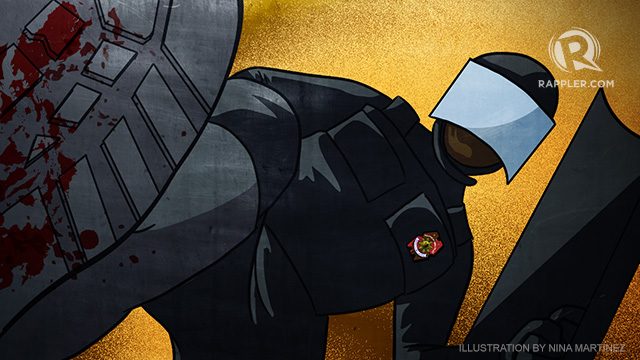SUMMARY
This is AI generated summarization, which may have errors. For context, always refer to the full article.

The latest scandal in the Philippine National Police (PNP) – of cops killing a “tokhang for ransom” victim right in the premises of the police headquarters in Camp Crame – is the latest in an endless litany of horror stories about police incompetence, corruption, human rights abuse and involvement in criminal activities.
This is not a simple problem of misfits and scalawags infiltrating the police force. Apparently no amount of screening, reorganization, revamp, reshuffling, or strike one policies have weeded out the undesirables. They continue sprouting all over the place.
It’s not a lack of training, orientation or institutional checks on corruption and abuse either. We have reams of laws, guidelines, circulars, memos, operations and training manuals that are supposed to ensure professionalism and integrity in the police force. There are redundant checks and balances, oversight mechanisms, disciplinary procedures and safeguard mechanism that should be enough to prevent corruption, abuse and incompetence in the PNP. There’s the National Police Commission (Napolcom), the Internal Affairs Service (IAS) and the People’s Law Enforcement Board (PLEB), among other institutional checks. Add to that scores of human rights education seminars, moral recovery campaigns, even waist-trimming programs. But still.
Some say the problem is low salaries or lack of benefits. But on the contrary, our police and military have among the best salaries and most comprehensive benefits in the government service; better than our teachers, health workers, and rank and file office workers. It definitely wouldn’t explain why the corruption goes all the way to the PNP’s top echelons, who earn more than enough to keep a comfortable life.
The problems are clearly deep-seated, historical, structural, and systematic.
It involves cultural and orientational flaws in all levels of the force. Idealistic, right-minded young recruits into the service are eaten up and mangled by this monster of an institution and converted into the anti-theses of what professional law enforcers should be. And it seems to have gotten worse.

Instrument of oppression
Today’s PNP has a long history and tradition as an instrument of oppression against our very own people. Its roots can be traced to the Philippine Constabulary created by the US government in 1901. The PC was formed primarily to suppress the country’s revolutionary movement that defeated Spain and turned to resist American colonial rule.
Much like the Spanish Guardia Civil, the PC was used by the American colonialists and their favored oligarchs (most of whom were also friendly to Spain) to impose their own brand of corrupt and oppressive rule over the local population.
After the Japanese Occupation in 1946, the PC turned its attention to the Hukbalahap guerillas who fought against the Japanese but opposed the return to US colonial rule. Once again, the PC was used to destroy our people’s capacity to fight the status quo.
To complement the PC, municipalities and cities were provided their own local police forces under the control of the mayors and governors through the Integrated National Police (INP). The localized INP ended up as private armies and adjuncts of the political dynasties and warlords that lorded over most of the country’s towns and provinces.
In 1975, the biggest warlord of them all, Ferdinand Marcos, merged the PC and the INP into one branch under the Armed Forces of the Philippines (AFP). The PC-INP played a key role in the dictatorship’s brutal counter-insurgency operations. It also made the police even more powerful and notorious in serving as thugs of the Marcos dictatorship and its favored dynasties and warlords. In tandem with other branches of the AFP, the PC-INP became a pillar of open fascist rule. It was used to crack down not only on criminals but on ordinary citizens who dared to oppose Marcos.
Under martial law, the military and police establishment reached the pinnacle of its power. It lorded over everyone and was answerable to no one. PC-INP officials eventually took over the vacuum left by the criminal syndicates supposedly dismantled by the Marcos regime. Thus did the culture of impunity spread like a virus infecting the highest to the lowest ranking member of the PC-INP.
Unfortunately, the crucial participation of the AFP in the ouster of Marcos in 1986 ensured its insulation from public accountablity in the post-dictatorship years. Succeeding regimes allowed the AFP, including the PC-INP, to remain intact and essentially pardoned for its numerous crimes against the people. Hardly any of its officials and personnel were charged, much less punished, for their involvement in 14 years of fascist atrocities.
The so-called abolition of the PC-INP in 1991 and its transformation to a civilian PNP did little to change its deeply ingrained traditions and practices, including its involvement in criminal activity and human rights abuses.
To this day, the PNP continues to play a key role in internal security operations that target patriotic and progressive groups that form the backbone of our civil liberties and human rights movements. It is also the main player in Oplan Tokhang and Oplan Double Barrel that have resulted in the killing of more than 6,000 suspected drug users and dealers.
With President Rodrigo Duterte covering their backs, today’s cops have become greatly emboldened in playing their traditional role as the people’s oppressors.
(Next: Why not abolish the PNP?). – Rappler.com
Teddy Casiño served as the partylist representative of Bayan Muna for 3 terms, from 2004-2013. Prior to his stint in Congress, he was secretary-general of the Bagong Alyansang Makabayan and was a columnist for BusinessWorld. He earned his degree in sociology from the University of the Philippines at Los Baños in 1993.
Add a comment
How does this make you feel?
There are no comments yet. Add your comment to start the conversation.